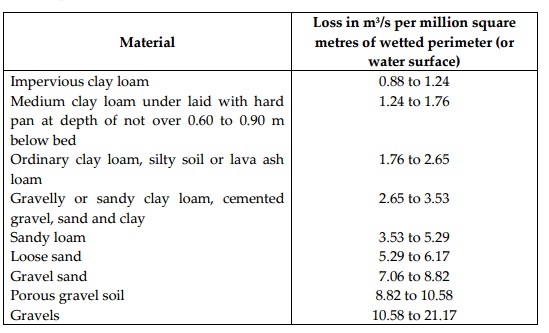Chapter: Civil : Water Resources and Irrigation Engineering : Canal Irrigation
Canal Losses
CANAL LOSSES
Water
comes in contact with an earthen surface, whether artificial or natural, the
surface of water. This absorbed water percolates deep into the ground and is
the main cause of loss of water carried by a canal. In addition, some canal
water is also lost due to evaporation. Loss due to evaporation is about 10 per
cent of the quantity lost due to seepage. The seepage caries with the type of
the material through which the canal runs. Obviously, the loss is near in
coarse sand and gravel, less in loam, and still less in clay soil. If the canal
carries harden water, the pores of the soil are sealed in course of time and
the canal seepage reduced time. In almost all cases, the seepage loss constitutes
an important factor which must be coated for in determining the water
requirements of a canal.
Between
the head works of a canal and the water courses, the loss of water on account
of the and evaporation is considerable. This loss may be of the order of 20 to
50 per cent of diverted at the head works depending upon the type of soil
through which canal runs the climatic conditions of the region.
For the
purpose of estimating the water requirements of a canal, the total loss due to
the separation and seepage, also known as conveyance loss, is expressed as m3/s
per million metres of either wetted perimeter or the exposed water surface
area. Conveyance loss calculated using the values given in Table. In UP, the
total loss (due to seepage and separation) per million square metres of water
surface varies from 2.5 m3/s for ordinary clay of 5.0 m3/s
for sandy load. The following empirical relation has also been found to give
curable results.

Material : Loss in m3/s per million
square metres of wetted perimeter (or
water surface)
Impervious
clay loam : 0.88 to 1.24
Medium
clay loam under laid with hard :
1.24 to 1.76
pan at
depth of not over below bed : 0.60 to 0.90 m
Ordinary
clay loam, silty soil or lava ash loam :
1.76 to 2.65
Gravelly or
sandy clay loam,
cemented gravel, sand and clay : 2.65 to 3.53
Sandy
loam : 3.53 to 5.29
Loose
sand : 5.29 to 6.17
Gravel
sand : 7.06 to 8.82
Porous
gravel soil : 8.82 to 10.58
Gravels : 10.58 to 21.17
In this
relation, ql is the loss expressed in m3/s per kilometer length of
canal and B and h are, respectively, canal bed width and depth of flow in
metres.
Related Topics